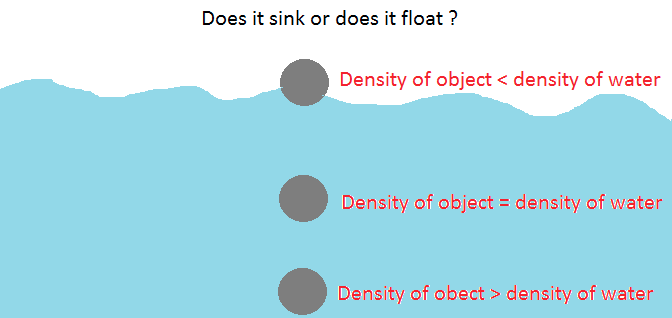Why do things float ?
Why do things float in water is really a great question. In order to understand the concept, you will need to review the lesson about density, Archimedes' principle and buoyancy.
Whether an object floats or sinks or does neither will depend on its weight or the force that pushes the object down and its buoyant force or the force that pushes the object up.
First, let us consider the case where the object neither float nor sink.
Common sense tells us that when the object neither sinks nor floats, the force that pushes the object up (buoyant force) is equal to the force that pushes the object down (weight)
This fact will help us deduct something important about the density of the object and the density of water.
Let us suppose that
Buoyant force = weight of object (1)
We also saw the following in the lesson about Archimedes' principle
Buoyant force = weight of displaced water (2)
Putting equations (1) and (2) together will give us
weight of object = buoyant force = weight of displaced water
We can then make this conclusion
When the buoyant force is equal to the weight of the object, weight of object = weight of displaced water.
We need two more things in order to make our conclusion.
First, we saw in the lesson about buoyant force that the volume of the object is equal to the volume of the displaced water.
Second, we need the formula for density.
Let us put it all together!
Weight of object = weight of displaced water
volume of object = volume of displaced water
What does this tell us about the density?
Suppose weight of object = weight of displaced water = 5 N
Suppose volume of object = volume of displaced water = 5 cm3The density of the object will therefore be the same as the density of water and it will be equal to
An object will neither float nor sink when the density of the object is the same as the density of the water or the fluid the object in submerged in.
Why do things float then?
Suppose buoyant force > weight of object, the object will float.
Weight of object < buoyant force
Since buoyant force = weight of displaced water, we get weight of object < weight of displaced water
And again, we know volume of object = volume of displaced water
Suppose weight of object = 4 N and weight of displaced water = 5 N
Suppose volume of object = volume of displaced water = 5 cm3Why do things float then?
An object will float when the density of the object is less than the density of water or the fluid the object is submerged in.
On the other hand, when the density of the object is more than the density of water or the fluid the object is submerged in, the object will sink.
The figure below is a summary that will help you determine when an object will float, sink, or do neither. Keep reading to see the explanations!
